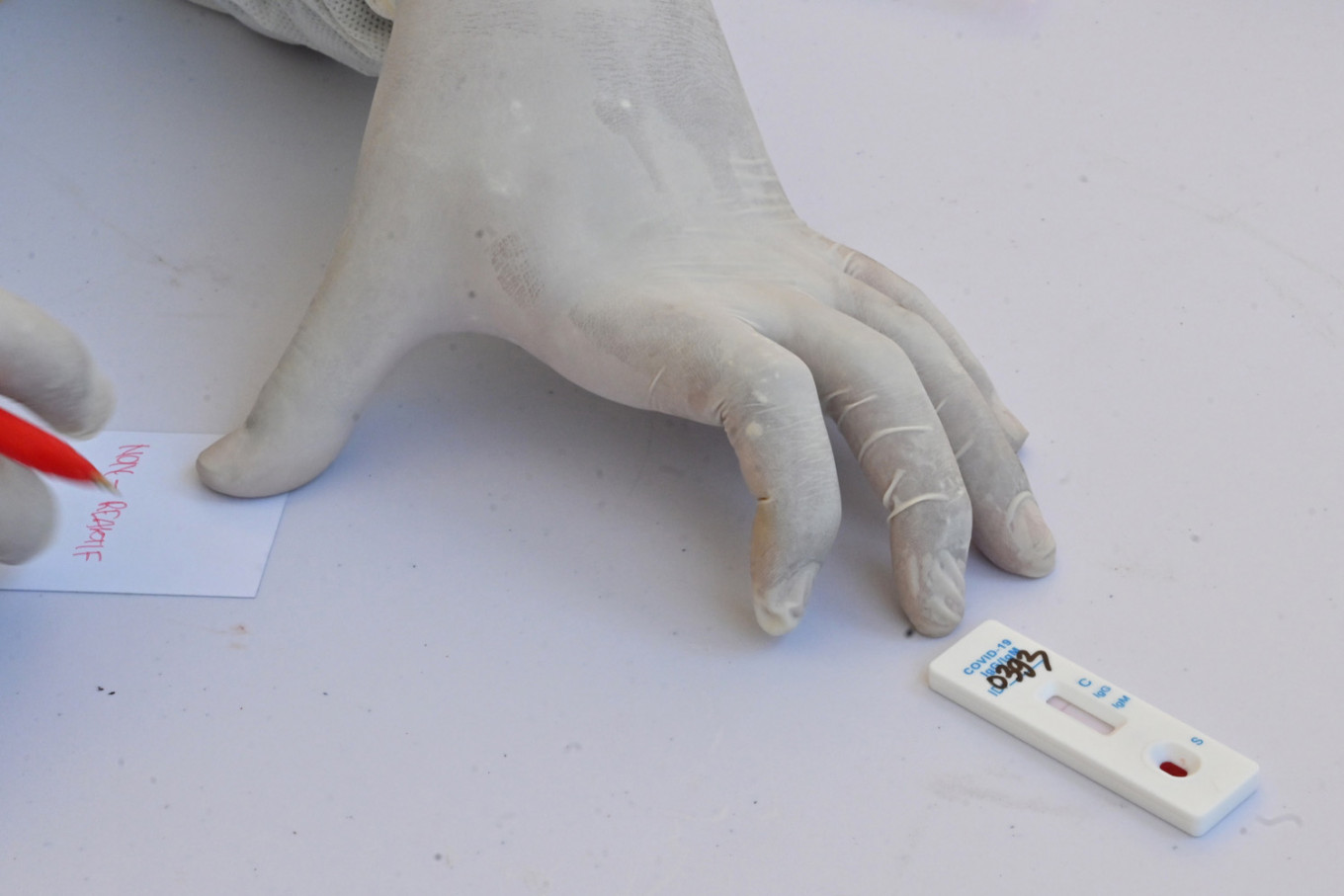Stigma, precarity deter Indonesians from getting tested for COVID-19
Indonesia’s high rate of COVID-19 infection has not stopped people throughout the archipelago from refusing to be tested, largely because of economic concerns and a fear of ostracism, despite the government’s efforts to contain the disease through increased mass testing.
Change Size

I
ndonesia’s high rate of COVID-19 infection has not stopped people throughout the archipelago from refusing to be tested, largely because of employment concerns and a fear of ostracism, despite the government’s efforts to contain the disease through increased mass testing.
Herdayati, a resident of Kampung Elektro in Penjaringan, North Jakarta, recalled how some of her neighbors shut themselves in when COVID-19 swab tests were being administered in the neighborhood’s community hall in June.
The authorities offered polymerase chain reaction (PCR) tests in the area after 23 residents were found to have the illness.
Of the approximately 300 residents invited to take the test, only 37 appeared.
Many were reluctant get tested because of fears of being stigmatized and losing opportunities to make a living, she said.
The fears were justified.
When the identities of the 23 people who initially tested positive for the disease in the community were discovered, panic spread and employers laid off some of Herdayati’s neighbors, who worked as laborers.
“People were afraid it would disrupt their own lives and the lives of their neighbors. ‘If I test positive, our people will be cornered.’ That’s what they said,” she told The Jakarta Post in a recent interview.
For the majority of people, economic considerations such as a loss of income are perceived to be just as important as public health, according to a joint survey of the Lapor COVID-19 community movement and Nanyang Technological University’s Social Resilience Lab. The survey compiled the responses of 154,471 people in Jakarta from May 29 to June 20.
More than 80 percent of respondents said economic considerations were just as important as public health, while 16 percent said economic considerations were more important. Only 3 percent said public health was more important.
And while many people were against risking COVID-19 infection to stay economically afloat (64 percent), some 13 percent of respondents said otherwise.
"It is concerning that there is still a group of people willing to get infected [to earn money]," said Sulfikar Amir, a disaster sociologist at NTU in Singapore who was involved in the survey, during a virtual press conference over the weekend.
“[They act] as if the coronavirus is just some kind of trickery,” Herdayati said.
About 18 percent of the respondents believed COVID-19 was man-made, while 23 percent believed it was not. The majority of people surveyed – 58 percent – said they didn’t know whether the disease was man-made or not.
“What makes it worrying is that there are still respondents who believe that COVID-19 was intentionally made or are unsure how to answer. This hesitation could potentially push them into believing it if they get information [that reinforces this belief],” Sulfikar said.
Residents of other regions have reportedly refused to take COVID-19 tests as well.
Ridhayani, a Makassar resident in South Sulawesi, recalled that banners in opposition to rapid testing had been put up in an alleyway in her community. They remained there until June.
"My mother said a lot of neighbors would not do it, probably because they feared being hospitalized or did not care about the disease," she told the Post. "I've seen many people not wearing masks outside their homes."
More than 20 residents of Setih village, Kayeli Bay, in Maluku’s Buru regency reportedly refused to take rapid tests because they believed the disease was fake, kompas.com reported last month. The residents were on a watch list compiled by the local health agency using contact tracing.
Hundreds of traditional vendors in Tabanan, Bali, Solok market in West Sumatra, Kramat market in Central Jakarta and Cileungsi market in Bogor, West Java, also refused to be tested, Reuters and local news outlets reported.
The wave of refusals has even caught the attention of President Joko “Jokowi” Widodo. “Why are people refusing to take PCR and rapid tests? [Because testing officers] come without advance notice and without informing people. That’s why we have refusals,” Jokowi said recently.
People’s reluctance to be tested is yet another challenge the government must face in its effort to ramp up national testing, which is needed to inform the virus mitigation policy.
As of Wednesday, 968,237 samples had been tested nationwide, according to data from the Health Ministry. The official COVID-19 tally in Indonesia stood at 68,079 cases and 3,359 deaths as of Wednesday.
Indonesian Public Health Expert Association (IAKMI) chairman Ede Surya Darmawan questioned the government’s public communications strategy.
“Have we been properly informing the public?" he asked. "Comprehension is important so that people won't think of refusing [the tests]."
Ede said the government could have disbursed social assistance to people who had been financially impacted after they were tested and could have kept them under subsidized quarantine if they were unable to make ends meet.
Imam Prasodjo, a sociologist from the University of Indonesia, suggested that the government tailor its COVID-19 public health messages to the local audience and enlist trustworthy public figures to deliver the messages.









